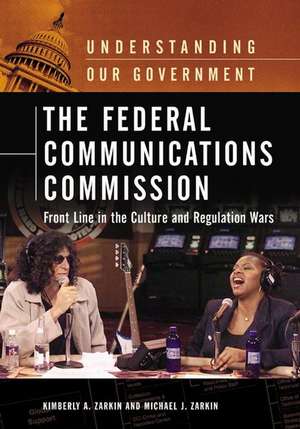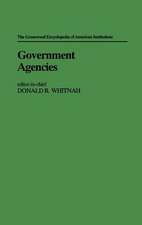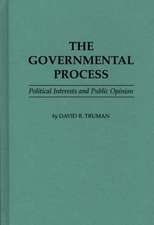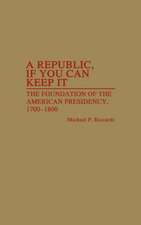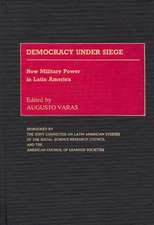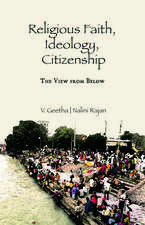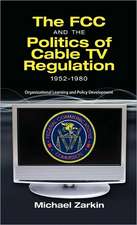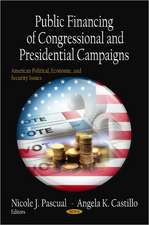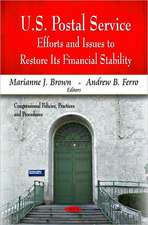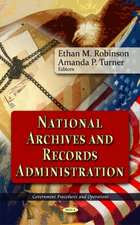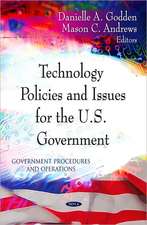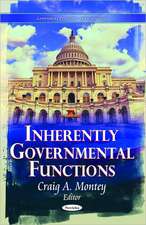The Federal Communications Commission: Front Line in the Culture and Regulation Wars: Understanding Our Government
Autor Kimberly A. Zarkin, Michael J. Zarkinen Limba Engleză Hardback – 29 apr 2006 – vârsta până la 17 ani
Preț: 355.40 lei
Preț vechi: 609.20 lei
-42% Nou
Puncte Express: 533
Preț estimativ în valută:
68.01€ • 71.33$ • 56.61£
68.01€ • 71.33$ • 56.61£
Carte tipărită la comandă
Livrare economică 01-15 aprilie
Preluare comenzi: 021 569.72.76
Specificații
ISBN-13: 9780313334160
ISBN-10: 0313334161
Pagini: 400
Dimensiuni: 178 x 254 x 31 mm
Greutate: 0.99 kg
Editura: Bloomsbury Publishing
Colecția Greenwood
Seria Understanding Our Government
Locul publicării:New York, United States
ISBN-10: 0313334161
Pagini: 400
Dimensiuni: 178 x 254 x 31 mm
Greutate: 0.99 kg
Editura: Bloomsbury Publishing
Colecția Greenwood
Seria Understanding Our Government
Locul publicării:New York, United States
Notă biografică
Kimberly A. Zarkin is Assistant Professor of Communications at Westminster College in Salt Lake City, UT. She is author of Anti-Indecency Groups and the Federal Communications Commission: A Study in the Politics of Broadcast Regulation (2003).Michael J. Zarkin is Assistant Professor of Political Science at Westminster College in Salt Lake City, UT. He is author of Social Learning and the History Of U.S. Telecommunications Policy, 1900-1996 (2003).
Cuprins
PrefaceThe FCC: The Origins and Purpose of an AgencyOrganization and ProceduresThe Political EnvironmentNotable Controversies in Telephone RegulationNotable Controversies in Mass Media RegulationBiographies of the CommissionersAppellate Court Cases, 1928-2004Annotated Bibliography of Selected Academic ResourcesAppendix A: Application for Renewal of Broadcast Station LicenseAppendix B: Policy Statement on Indecency
Recenzii
This collection of information for the general readership dispels the confusion about the mission of the FCC, its authority, and its activities. It starts with a brief history, beginning during the New Deal, continuing through the new days of cable. It describes the commission's organization and procedures, the political environment surrounding it, notable controversies in telephone and mass media regulation, biographies of the current commissioners, annotated Supreme Court decisions from 1930 to 2004, and a chronology of key events. Appendices include a list of case law on a variety of issues, including the breakup of the Bell system and indecency rulings.
[S]uitable for college or high school students researching FOC matters, as well as anyone who wants to learn more about the agency..[a] useful book if you are involved in teaching broadcast regulation or want to understand the workings of the commission on a broad scope.
[A] nuts-and-bolts look at the agency, a history of its evolution and a survey of its controversial and important cases - including Howard Stern, the fairness doctrine and questions of how far any government agency should go in regulating content. The book is more textbook than opinion or advocacy, which serves the reader well in understanding why the commission has taken certain actions and not others. It is not authorized, for instance, to initiate complaints against any broadcasters. It can act only on complaints it receives from the public. Moreover, while the FCC is an independent agency, the Zarkins explain how it often reflects Congress and the President..The book isn't always a breezy read. But it's a valuable one.
[S]uitable for college or high school students researching FOC matters, as well as anyone who wants to learn more about the agency..[a] useful book if you are involved in teaching broadcast regulation or want to understand the workings of the commission on a broad scope.
[A] nuts-and-bolts look at the agency, a history of its evolution and a survey of its controversial and important cases - including Howard Stern, the fairness doctrine and questions of how far any government agency should go in regulating content. The book is more textbook than opinion or advocacy, which serves the reader well in understanding why the commission has taken certain actions and not others. It is not authorized, for instance, to initiate complaints against any broadcasters. It can act only on complaints it receives from the public. Moreover, while the FCC is an independent agency, the Zarkins explain how it often reflects Congress and the President..The book isn't always a breezy read. But it's a valuable one.
